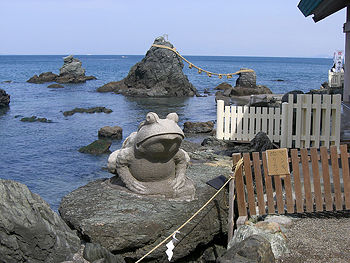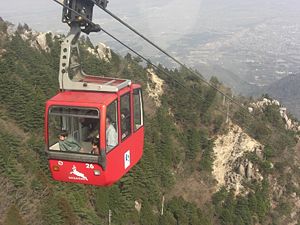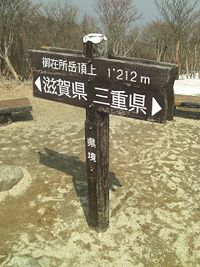Mie prefecture: Difference between revisions
imported>John Stephenson (misplaced sentence moved back) |
imported>John Stephenson (capital city) |
||
| Line 3: | Line 3: | ||
'''Mie prefecture''' (三重県 ''Mie-ken'') is an area of [[Japan]] located in the [[Kansai]] region of [[Honshu]] island. Its population was 1,873,000 in 2006.<ref>''Japan Statistical Yearbook'': '[http://www.stat.go.jp/data/nenkan/zuhyou/y0203000.xls Population by Prefecture 1920-2006]'. Ministry of Internal Affairs and Communications. .xls document.</ref> | '''Mie prefecture''' (三重県 ''Mie-ken'') is an area of [[Japan]] located in the [[Kansai]] region of [[Honshu]] island. Its population was 1,873,000 in 2006.<ref>''Japan Statistical Yearbook'': '[http://www.stat.go.jp/data/nenkan/zuhyou/y0203000.xls Population by Prefecture 1920-2006]'. Ministry of Internal Affairs and Communications. .xls document.</ref> | ||
Mie's best-known | Although the capital is Tsu (津市 ''Tsu-shi''), Mie's best-known city is [[Ise]] (伊勢市 ''Ise-shi''), with its [[Shinto]] (神道 ''Shintoo'') shrines; these are collectively referred to as the 'Ise Shrine' (伊勢神宮 ''Ise-jinguu'') and are considered the centre of Japan's native [[religion]]. The 'Inner Shrine' (内宮 ''Naikuu'') is actually located on the outskirts of the city, while the 'Outer Shrine' (外宮 ''Gekuu'') is more central, near the railway station. The Inner Shrine is reputed to be home to the ''Yata no Kagami'' (八咫鏡), the 'Sacred Mirror' associated with the [[Japanese Imperial Family]];<ref>''Isejingu'': '[http://www.isejingu.or.jp/english/myth/myth4.htm The tale of the sacred mirror Yata-no-Kagami]'.</ref> however, it is not possible to see this. Every twenty years, the shrine is pulled down so that the site can be ritually repurified; following this, a new shrine is built. This will occur for the sixty-second time in 2013.<ref>''Japan Guide'': '[http://www.japan-guide.com/e/e4300.html Ise Shrines]'.</ref> | ||
[[Image:Gozaisho-ropeway.jpg|right|thumb|300px|{{#ifexist:Template:Gozaisho-ropeway.jpg/credit|{{Gozaisho-ropeway.jpg/credit}}<br/>|}}[[Cable car]]s are known as 'ropeways' in Japan. This one brings visitors from near Mie's Yunoyama Onsen station (湯の山温泉駅) towards the summit of Mount Gozaisho (御在所); a ski lift is available to reach the actual summit.]] | [[Image:Gozaisho-ropeway.jpg|right|thumb|300px|{{#ifexist:Template:Gozaisho-ropeway.jpg/credit|{{Gozaisho-ropeway.jpg/credit}}<br/>|}}[[Cable car]]s are known as 'ropeways' in Japan. This one brings visitors from near Mie's Yunoyama Onsen station (湯の山温泉駅) towards the summit of Mount Gozaisho (御在所); a ski lift is available to reach the actual summit.]] | ||
Mie is home to several institutions of higher education, notably [[Mie University]] (三重大学 ''Mie Daigaku'') in | Mie is home to several institutions of higher education, notably [[Mie University]] (三重大学 ''Mie Daigaku'') in Tsu. | ||
[[Image:Gozaisho-sign.jpg|right|thumb|200px|{{#ifexist:Template:Gozaisho-sign.jpg/credit|{{Gozaisho-sign.jpg/credit}}<br/>|}}A sign marks one spot where [[Shiga prefecture|Shiga]] and Mie prefectures meet, at the summit of Mount Gozaisho.]] | [[Image:Gozaisho-sign.jpg|right|thumb|200px|{{#ifexist:Template:Gozaisho-sign.jpg/credit|{{Gozaisho-sign.jpg/credit}}<br/>|}}A sign marks one spot where [[Shiga prefecture|Shiga]] and Mie prefectures meet, at the summit of Mount Gozaisho.]] | ||
Revision as of 00:13, 6 April 2008

Futami (二見 literally 'look twice') hosts the Okitami-jinja (興玉神), better known as the 'Frog Shrine',[1] and the Meoto Iwa (夫婦岩), 'Wedded Rocks'.
Mie prefecture (三重県 Mie-ken) is an area of Japan located in the Kansai region of Honshu island. Its population was 1,873,000 in 2006.[2]
Although the capital is Tsu (津市 Tsu-shi), Mie's best-known city is Ise (伊勢市 Ise-shi), with its Shinto (神道 Shintoo) shrines; these are collectively referred to as the 'Ise Shrine' (伊勢神宮 Ise-jinguu) and are considered the centre of Japan's native religion. The 'Inner Shrine' (内宮 Naikuu) is actually located on the outskirts of the city, while the 'Outer Shrine' (外宮 Gekuu) is more central, near the railway station. The Inner Shrine is reputed to be home to the Yata no Kagami (八咫鏡), the 'Sacred Mirror' associated with the Japanese Imperial Family;[3] however, it is not possible to see this. Every twenty years, the shrine is pulled down so that the site can be ritually repurified; following this, a new shrine is built. This will occur for the sixty-second time in 2013.[4]

Cable cars are known as 'ropeways' in Japan. This one brings visitors from near Mie's Yunoyama Onsen station (湯の山温泉駅) towards the summit of Mount Gozaisho (御在所); a ski lift is available to reach the actual summit.
Mie is home to several institutions of higher education, notably Mie University (三重大学 Mie Daigaku) in Tsu.

A sign marks one spot where Shiga and Mie prefectures meet, at the summit of Mount Gozaisho.
Footnotes
- ↑ 'Frog' (蛙 kaeru) and the verb 'come back' (帰る kaeru) sound very similar in Japanese; therefore, frogs are associated with a safe journey.
- ↑ Japan Statistical Yearbook: 'Population by Prefecture 1920-2006'. Ministry of Internal Affairs and Communications. .xls document.
- ↑ Isejingu: 'The tale of the sacred mirror Yata-no-Kagami'.
- ↑ Japan Guide: 'Ise Shrines'.